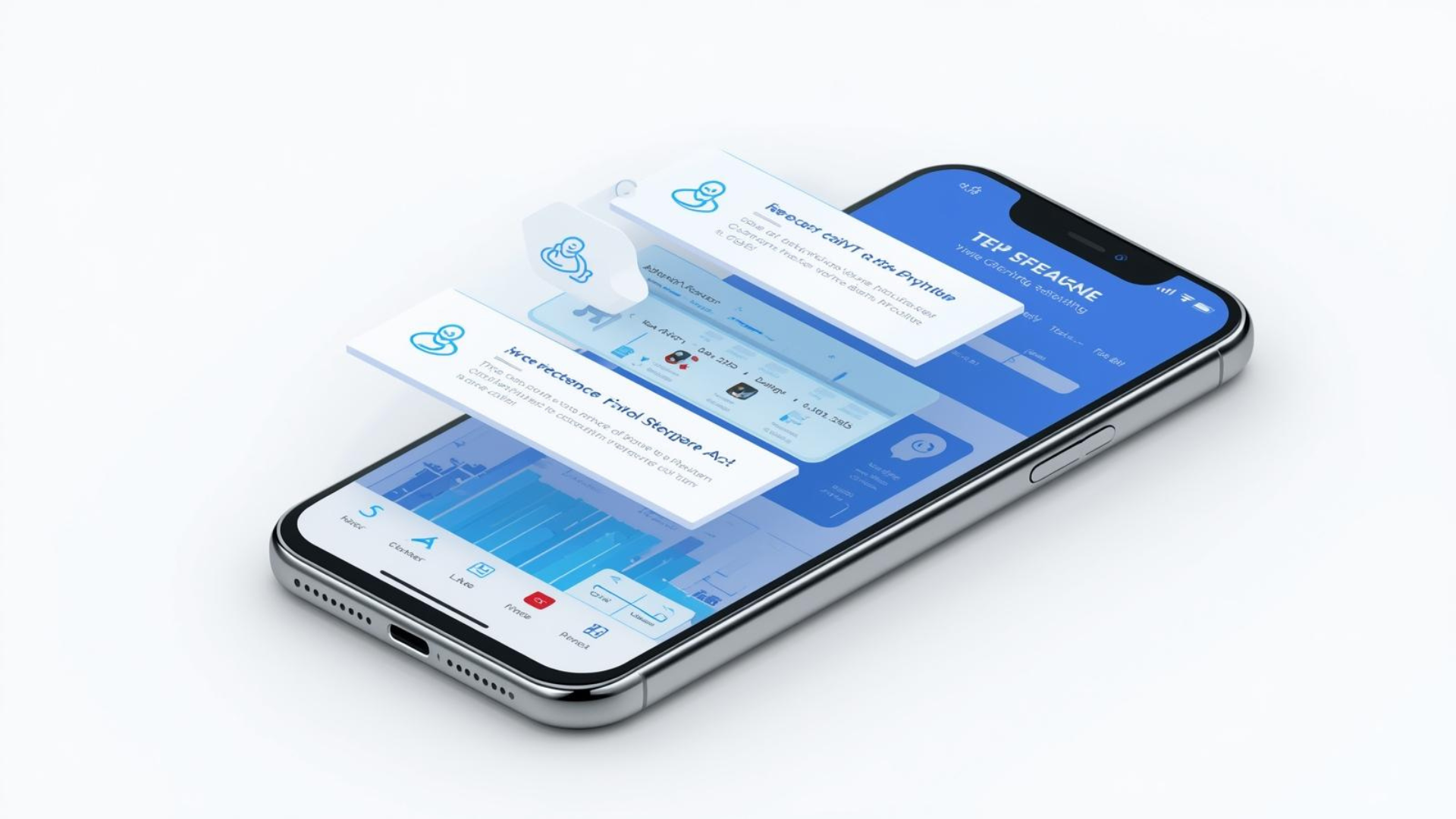How Commercial HVAC Service Software Streamlines Fieldwork
Audio overview: Listen & Learn
Field service teams operate at a rapid pace, routine maintenance costs clients millions, and exceptional service windows remain tight in the HVAC industry.
Yet many HVAC companies still rely on spreadsheets, scattered calls, and paperwork.
HVAC service software/solutions bring customer satisfaction and more construction jobs. With the help of this software, teams follow a schedule, payments arrive faster, and compliance paperwork stays organised.
It provides HVAC professionals with real-time visibility into job sites, tracks every invoice from payment through job costing, and offers seamless customer management.
How Commercial HVAC Software Improves Field Service Efficiency
HVAC service software transforms field operations into disciplined inventory management, boosting operational efficiency.
It streamlines HVAC scheduling, accelerates dispatch, ensures precise invoice tracking, and enhances customer interactions through dedicated and robust reporting tools.
It also helps the technicians receive precise job details before arrival. Through this software, office teams are assigned tasks with accuracy, utilizing real-time data on availability and skill sets to ensure efficient task allocation.
Moreover, invoice tracking flows without delay, creating predictable cash cycles. Digital forms replace paperwork, creating clean compliance records ready for audits.
Key takeaways:
- HVAC field service software creates operational clarity and financial strength.
- It streamlines dispatch, accelerates invoicing, improves customer experiences, and keeps compliance organised.
- Platforms like HVACbase equip commercial HVAC teams to scale efficiently and outperform competitors with disciplined, data-driven field operations.
What Is Commercial HVAC Service Software?
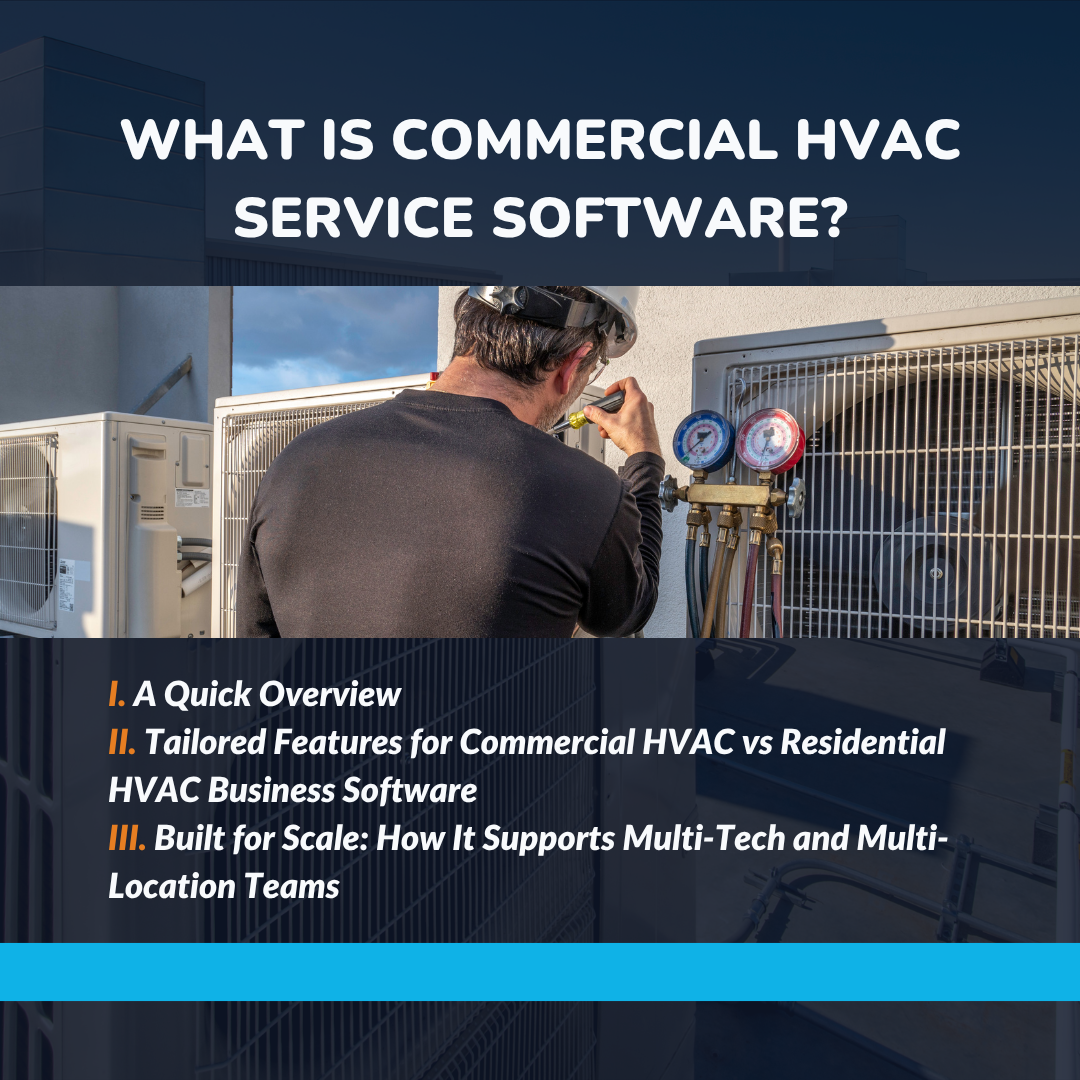
I. A Quick Overview:
Commercial HVAC service software features include job scheduling, invoicing, and customer communication. It smoothens HVAC business operations into structured workflows.
The global sales of HVAC software are expected to reach USD 737.7 million in value in 2025 and are expected to increase to USD 1,527.5 million by 2035, which represents a CAGR of 7.6%.
Teams receive job details on HVAC mobile apps, including job tracking and job costing. Office staff can schedule work with precision, while organized invoicing ensures steady, predictable cash flow.
II. Tailored Features for Commercial HVAC vs Residential HVAC Business Software:
HVAC field software is designed to address service tiers, track inventory, manage preventive maintenance contracts, facilitate HVAC estimating, and handle complex compliance reporting.
The functionality of residential jobs often lacks many key features or fails to incorporate them. This can lead to operational gaps.
On the other hand, commercial HVAC software provides direct access to asset and service history, service agreements, and emergency repair logs, which construction professionals typically handle, as well as CRM capabilities.
III. Built for Scale: How It Supports Multi-Tech and Multi-Location Teams:
- Real-Time Tracking: Monitors availability, job location, and job progress across multiple sites.
- Skill-Based Job Assignment: Matches technicians to jobs based on requirements and experience with specific equipment types.
- Centralized Operations Management: Enables service operations managers to coordinate field teams, schedule work efficiently, and maintain business performance across the entire business.
Why Traditional Tools No Longer Work for HVAC Service Teams?
Let us have a look at the causes :
A. Lost Revenue Opportunities
Scheduling errors and slow dispatch processes result in unassigned construction jobs. As a result, HVAC technicians sit idle while urgent service requests remain unanswered.
Revenue slips through operational cracks, giving competitors the chance to win projects your team should be completing.
B. Poor HVAC invoicing and payment processing
Manual invoicing delays payment cycles. HVAC techs complete jobs, only to find out that invoices remain unsent for days. Additionally, payments are not cleared promptly without the use of accounting software.
C. Lower Customer Satisfaction
Clients demand fast updates, clear communication, and seamless service experiences. Using traditional tools also results in phone tag, incomplete paperwork, and slow follow-ups, which frustrate facility managers.
And as a result, dissatisfied clients begin sourcing alternative providers with stronger systems.
D. Inefficient Team Utilisation
HVAC tech spends time on calls confirming job details; meanwhile, office staff handle paperwork and manually update spreadsheets.
In short, each step wastes productive hours, resulting in the loss of more jobs completed per day and a reduction in operational profitability.
Read: 5 Proven Ways HVAC Business Owners Can Maximize ROI with Software
Streamlining Fieldwork: The Power of HVAC Service Software
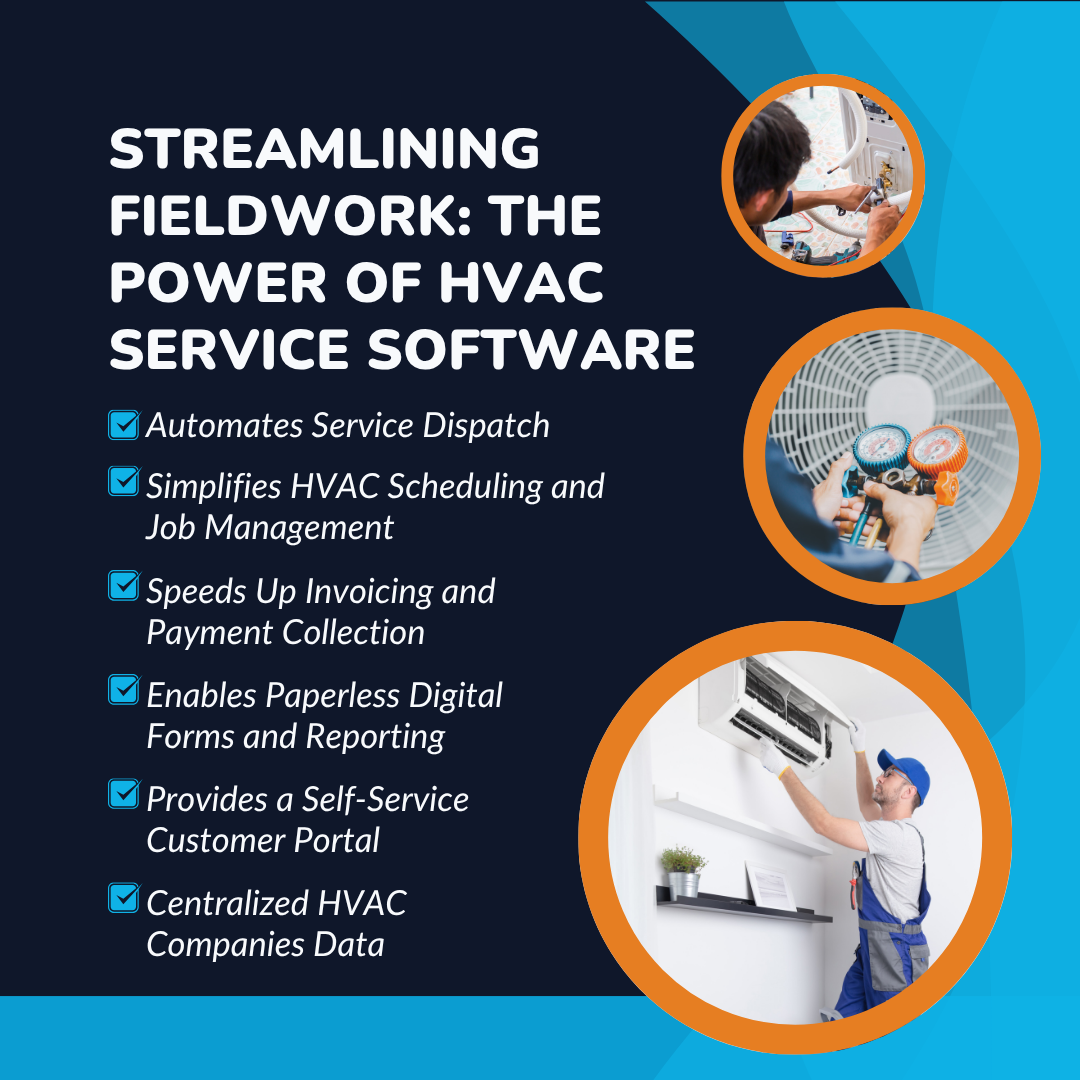
HVAC software not only supports your business's in-office operations but also facilitates effective fieldwork management. Now, let us walk through how HVAC software solutions streamline the fieldwork:
1. Automates Service Dispatch
HVAC service software assigns technicians based on skills, availability, and the customer's location. Through this, manual coordination becomes structured dispatch.
Managers are typically juggling multiple calls to verify technicians' availability for job scheduling, accounting for an average of 20% of their workday.
However, by using HVAC software, technicians receive precise job details on their mobile apps before arrival. It improves response time, reduces miscommunications, and jobs are completed with precision.
2. Simplifies HVAC Scheduling and Job Management
Schedules are updated within a central dashboard. Teams in the office can also avoid double-booking and missed appointments by using HVAC scheduling software solutions.
It also supports live job status tracking, which enables immediate adjustments to meet shifting priorities and fieldwork flows without disruption.
3. Speeds Up Invoicing and Payment Collection
Invoices are generated immediately after job completion and are sent to customers right away, resulting in faster payment cycles.
Meanwhile, outstanding payments remain visible within the hvac crm system, with automated reminders ensuring consistent cash flow.
4. Enables Paperless Digital Forms and Reporting
Technicians digitally complete inspection checklists, service reports, and compliance forms on-site. Once submitted, the customer data then syncs to the office for processing and organized record-keeping as soon as it is completed.
This eliminates paperwork errors and ensures compliance documentation is always accurate, up-to-date, and audit-ready.
5. Provides a Self-Service Customer Portal
There is a dedicated portal where clients can log in, request services, view the status of their job-related work, review their service history, and pay invoices.
This organized process minimizes the need for calls and emails to office staff. This not only means better efficiency but also structured and transparent engagement with clients, ensuring they are more satisfied.
6. Centralized HVAC Companies Data
All job and customer details, payment histories, and compliance documentation are stored on one platform.
Operations managers can easily locate the data, review accounts quickly, and make informed decisions based on the exceptional operational data that is available.
How to Choose the Right HVAC Management Software?
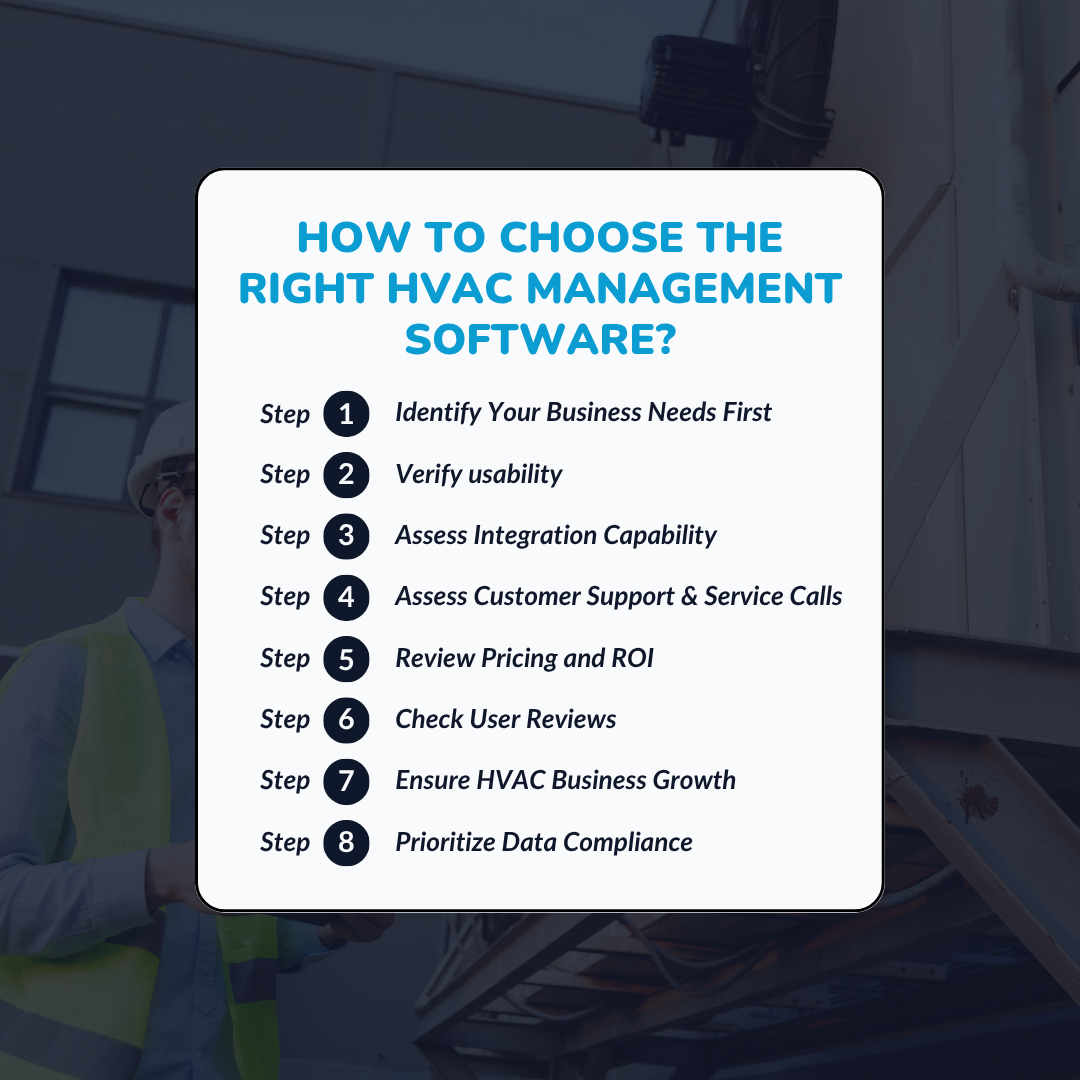
Follow the steps to choose the right HVAC management software:
Step 1: Identify Your Business Needs First
Analyze your operational requirements before evaluating software. Discuss if your technicians require scheduling, dispatch, invoicing, customer portals, or a fully integrated solution.
Define your service area, like commercial, residential, or both. List your daily challenges and map these against software features to ensure alignment with the
field.
Step 2: Verify usability
Choose HVAC field software with an intuitive interface. Book a demo: test workflow navigation speed and mobile accessibility. Teams adopt systems faster when tools feel natural and easy to use.
Step 3: Assess Integration Capability
Assess the integration capabilities of the software with your existing accounting system. These systems include: Customer Relationship Management (CRM) system, inventory systems, and any other systems you use before starting with HVAC software.
Following this step will help you avoid duplicating data entry and syncing errors.
Step 4: Assess Customer Support and Service Calls
When selecting HVAC software, it’s crucial to evaluate the level of customer support it offers.
Reliable support ensures that any technical issues or questions are resolved quickly, minimizing downtime for your team.
Additionally, look for features that make managing service calls easier—such as real-time job tracking, automated dispatching, and instant communication with technicians—to improve response times and customer satisfaction.
Step 5: Review Pricing and ROI
Understand pricing models clearly. Check subscription charges and re-check time savings and projected revenue improvements to justify investment decisions.
Step 6: Check User Reviews
Study experiences from similar HVAC businesses. Identify wins and operational challenges they resolved using the software.
Also, prioritize reviews, dispatch efficiency, invoicing speed, and improvements in customer satisfaction.
Step 7: Ensure HVAC Business Growth
Choose software that helps you grow with your business. Verify that it can accommodate technicians, an increased service area, and multiple locations, without adversely impacting performance.
Step 8: Prioritize Data Compliance
Verify that the platform offers data encryption and secure cloud hosting to meet local data protection requirements. A secure system will protect your business's reputation and customer confidence.
Check this: A Complete Guide to HVAC Project Management Software for 2025
Introducing HVACBase: All-in-One Software for Commercial HVAC Pros
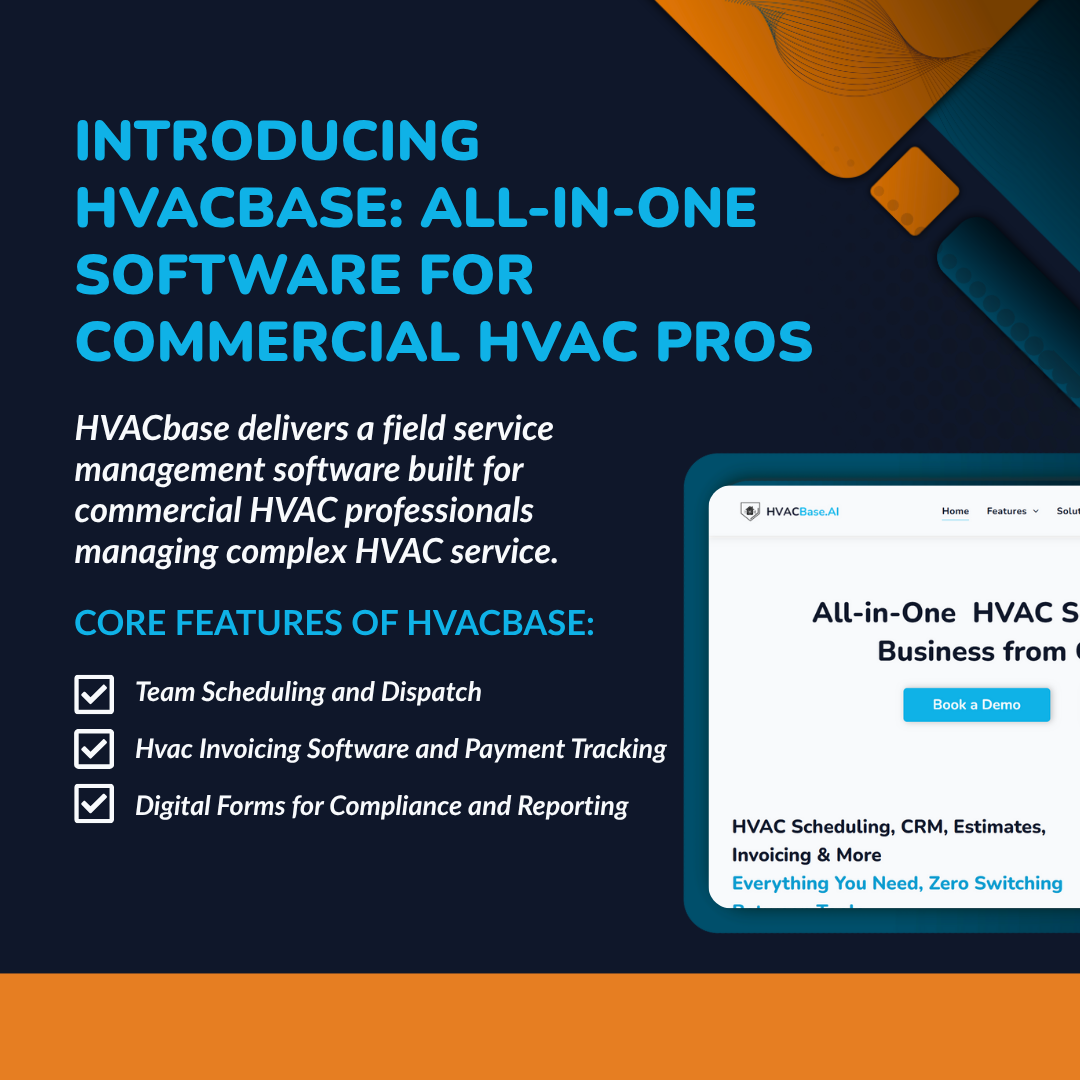
HVACBase delivers a field service management software built for commercial HVAC professionals managing complex HVAC service.
Commercial HVAC companies need it for customer information management, HVAC scheduling, field service management, and payment processing. It replaces fragmented tools with a unified project management and HVAC management software engineered for scale, speed, and precision.
Core features of HVACBase:
I. Team Scheduling and Dispatch
HVACBase enables operations managers to schedule jobs and dispatch HVAC contractors efficiently. Live technician availability, skill-based assignment, and route optimisation ensure teams stay productive and clients receive rapid service.
II. HVAC Invoicing Software and Payment Tracking
The platform automates invoice generation immediately after job completion. Payments are checked in real-time, with reminders sent to clients to improve cash flow. Accounting integrations also help financial data remain aligned without requiring manual updates.
III. Digital Forms for Compliance and Reporting
HVACBase replaces paper forms with structured digital templates for inspections, service reports, and compliance checklists. Completed forms sync instantly to the office, keeping records audit-ready and organised.
Final Thoughts: Modernising Your Commercial HVAC Operations
HVAC business software is a strategic advantage. Operators using HVACbase build disciplined field operations, maintain clear inventory management, and deliver seamless customer experiences.
Manual systems limit technician productivity, delay payments, and create service inconsistencies. Modernising with HVACBase establishes structured workflows that scale with growth ambitions.
Evaluate your current workflows with customer management tools today. Identify operational gaps affecting dispatch efficiency, invoicing speed, compliance readiness, and customer interactions. Teams equipped with the right software outperform competitors and create lasting client trust.
Transform Your HVAC business with HVACBaseToday!
Ready to build disciplined, efficient HVAC operations?
HVACBase equips your team with structured dispatch, automated invoicing, and seamless commercial client portals. Discover how it boosts field productivity and streamlines HVAC service agreements.
Book your HVACBase demo today.
FAQs
Q.1. What is the best HVAC software for commercial?
The best HVAC software for commercial allows you to schedule appointments, dispatch workers, invoice customers, provide a customer portal user experience, and create a commercial-specific compliance form, all in one application.
Q.2. Which is better, an Air conditioning unit or an HVAC system?
It depends on your requirement. Air conditioning is designed to cool a specific space, whereas HVAC systems serve a similar purpose but also provide heating and ventilation.
Q.3. What is the difference between HVAC and commercial HVAC?
HVAC is used for heating, ventilation, and air conditioning in residential and commercial settings. Commercial HVAC, on the other hand, is used for heating, ventilation, and air conditioning in commercial settings, such as hospitals and malls.
Have questions or need personalized advice?
Talk to an Expert Today and let our construction specialists guide you to success.





